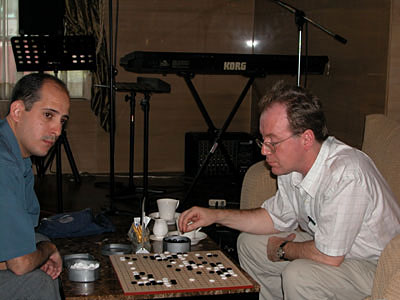2003-09-25No internet
The hotel has internet, but I do not get it to work. So I cannot FTP this diary to my site. There are plenty of Internet / PC shops in town, but they all look very shabby. I wonder what would happen if I would walk in with my laptop and would ask "Internet?" I haven't dared to try that yet.
Another long walk
As yesterday, I went into town, but got a lot further this time (I avoided the hills). At a certain point, it all looks the same. Chris Rafferty from Dublin, whom I had dinner with yesterday, went to another part of town (seven stops with the metro) to find some shaving foam. His comment when he was back: it looks all the same.
No baduk
There is no Baduk set in the hotel. I went to the Tourist office, where a very nice girl who speaks good English was very helpful. Where can I buy a Baduk set? She had never had that question before, she said. Certainly there is no Baduk shop in Incheon. She did not know whether there is one in Seoul. But in any case she started phoning around until she had found a stationary shop that had a Baduk set. Was I going by train or did I want a taxi? I said I'd take a taxi. She wrote down detailed instructions for the driver -- it is a bit difficult to find, she said. Well it was. The driver was muttering I do not know what while he tried to drive his car through some very narrow streets. But he found it. I walked the way back, three quarter of an hour later I was back in the hotel with a Baduk set. Costs: 2,000 won for the taxi, 4,000 won for the board and 4,000 won for the stones. Ten euro for a decent beginners set.
Note: the back side is the Korean chess board that I made a picture of yesterday. Oh I thought: let me buy the pieces for Korean chess -- 2,000 won. Now where are the rules? It is similiar to Chinese chess, that much I know. But not the same, for instance the king has to start in the centre of the castle.
Remains the question: how popular is Baduk really in Korea? Or is the popularity mainly in Seoul?

2003-09-25: Chris Rafferty (Ireland) and Irwin Hernandez Nunez (Venezuela) play the first game with my new Korean Baduk set. Chris went all out attacking a group but forget to make enough territory.
Tourist traps?
So taxi's are cheap, dead cheap. Yesterday evening we took a taxi to a row of restaurants at the waterfront. More precise, we first went into town, didn't find a nice place and asked the driver to turn around and go to the waterfront. Cost: 3,000 won. The first restaurant we looked at was called "Netherlands", so of course it was more or less Italian, and the pizza was 20,000 won. No thank you. We ended up in a pub where they serve side dishes for a "reasonable" price of 15,000 won (and a small beer was 3,000 won). The food was ok. Later we went to a pub near the hotel where the prices were exactly half of that: half a liter of beer for 3,000 won and side dishes for 8,000. The only problem: we couldn't read the menu card and the owner couldn't translate it for us.
I don't think these expensive places are tourist traps like the Fado restaurants in Lissabon: here locals go there too. But it feels a little bit like it. I think it is just that the differences in income are bigger than where I come from. People with money go to expensive places and show off. They get the same beer for quadruple the normal price, the service is lousier, but who cares.
Korean mama in China town
We played some go -- sorry Baduk -- in the afternoon. Cindy did not show up. But other players are arriving. And around 17:00 p.m. the tournament committee finally was there. No Cindy, but another interpreter. We started talking. He took the player from Madagaskar, Maherizo Razafindrabe and me to his favourite nearby Chinese restaurant. Yes indeed, a menu on the wall and only in Korean, and yes, dead cheap. Sort of Nasi Goreng + fried vegetables + noodles + pork + kimshi + egg soup for 5,000 won a person in mama-san's little restaurant. The tea was free. All very good. The most expensive menu on her list is a multiple dishes meal for 5 persons for 30,000 won total.
PS -- Nasi Goreng: those were the words of the interpreter. He had been to Holland... It is Dutch / Indonesian for fried rice mixed with some vegetables and meat. He also gave the recipy for kimshi: vegetables layed in with vinegar and fermented fish or shrimp pasta (Indonesian: trassi) plus red pepper. If you want it to make yourself, you'll probably have to add some sugar.
Now that reminds me, I should make a picture tomorrow of several square meters of red pepper drying in the sun... Tomorrow's shopping list is pictures and pottery. I'll probably have to get back to that nice Tourist Office girl for item number 2.